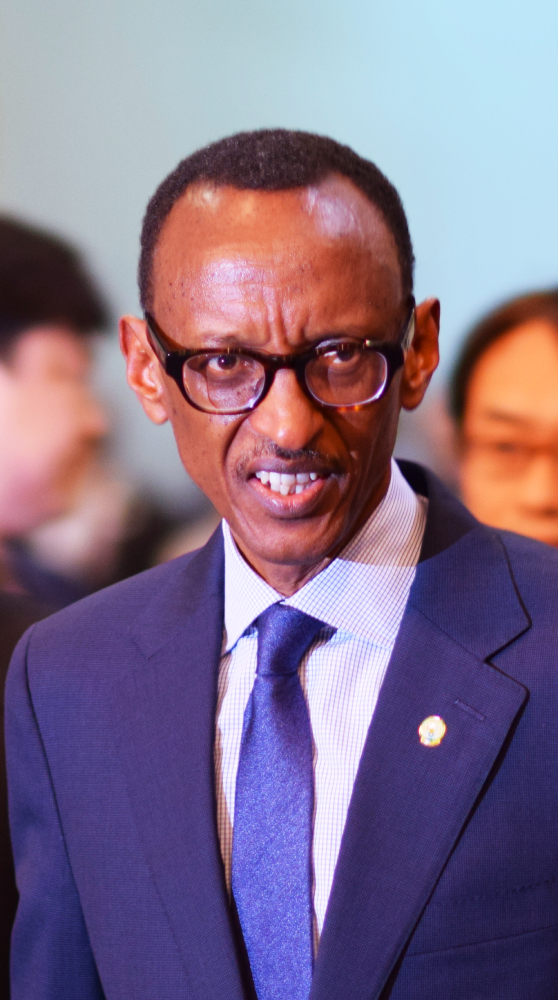Rwanda’s elections in 2024 are expected to be a tightly managed electoral exercise. President Paul Kagame was declared the winner of the 2017 elections with 99 percent of the vote and the results are unlikely to vary much during this cycle. Independent observers concluded that the previous electoral process was marred by numerous irregularities, including political intimidation, unfair registration practices, and alleged fraud during the balloting itself.

Rwanda President Paul Kagame. (Photo: Veni Markovski)
Kagame has ruled Rwanda since 1994, coming to power in the wake of the genocide of an estimated 800,000 Tutsis and moderate Hutus. This would be the 66-year-old Kagame’s fourth official term. A controversial constitutional amendment in 2015 allowed him to evade the prevailing two 7-year term limit provision and run for two additional 5-year terms, which would bring his tenure in power to 40 years. This bypassing of term limits was part of a wave of term-limit evasions in Africa that began in 2015 and reversed a period of term-limit respecting norms. In practical terms, Kagame is in position to remain president for life.
The ruling Rwandan Patriotic Front (RPF) has prevented serious contenders from running via intimidation, arrests, and judicial actions. Currently, the only other candidate contesting for the presidency in the 2024 election is Frank Habineza from the Democratic Green Party of Rwanda. He received less than one percent of the votes in the 2017 election, and his party holds 2 of the 53 seats in Rwanda’s lower house, the Chamber of Deputies.
One of Kagame’s fiercest critics, Victoire Ingabire Umuhoza, is also interested in running. However, she is barred due to a previous arrest for “inciting divisionism and conspiring against the government,” a charge most observers and the African Court on Human and Peoples’ Rights consider politically motivated. Ingabire served a total of 8 years in prison until 2018, when she was released on a presidential pardon.
Rwandans living abroad refrain from political activism and live in fear of attacks on them or relatives in Rwanda.
Rwanda has developed a reputation for not only intimidating domestic opponents but also threatening critics in exile, including attacks and extrajudicial killings. Rwandans living abroad, therefore, practice self-censorship, refrain from political activism, and live in fear of attacks on them or relatives in Rwanda. The government has made “creating a hostile international opinion” of the Rwandan government a criminal offense.
The media in Rwanda is tightly controlled and those who engage in independent reporting are subject to criminal charges and intimidation. Penal code revisions in 2018 criminalized cartoons and writings that “humiliate” Rwandan leaders. As more Rwandan journalists have gone into exile and attempt to write from outside the country, the government has increasingly blocked access to news services and websites outside the country.
The judiciary lacks independence in practice. Senior judicial officials are appointed by the President and approved by the RPF-dominated Senate.
The military remains one of the most powerful political institutions in the country with several ambitious military leaders vying to succeed Kagame. This is thought to be behind Kagame’s move to reshuffle the military hierarchy and retire 83 Rwanda senior officers, including 12 generals, in the wake of Africa’s coup wave.
Rwandan foreign policy is first and foremost focused on maintaining influence in the eastern DRC.
Securocrats are influential in shaping Rwandan foreign policy. This is first and foremost focused on maintaining influence in the eastern Democratic Republic of the Congo (DRC), where the Rwandan government is intent on preventing the Hutu nationalist Democratic Forces for the Liberation of Rwanda (FDLR) from regaining a footing. Rwanda has long been alleged to sponsor the M23 rebels, a key destabilizing force in the eastern DRC. The escalation of that conflict—driven by rivalries between the leaders of Rwanda, the DRC, and Uganda—threatens to pull the Great Lakes region into another Congo War.
Rwanda’s military has been a central feature of Rwandan foreign policy in recent years through its deployment to United Nations peace operations, to which Rwanda is the largest African contributor of troops. Rwanda has also earned regional and international backing through its support for counterinsurgency operations in the Central African Republic and Mozambique, in exchange for fees and commercial contracts.
Rwanda’s 2024 electoral exercises are not expected to generate any surprises. Still, there is much to keep track of in Rwanda from the Great Lakes to across the continent.


 Rwanda: July 15
Rwanda: July 15